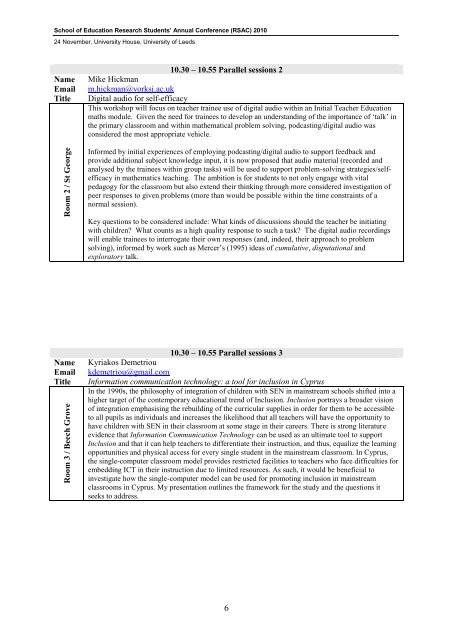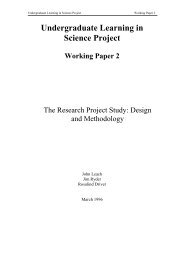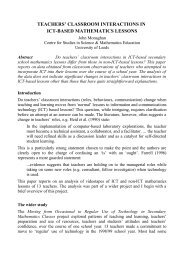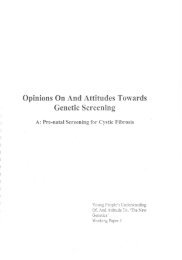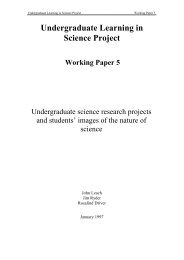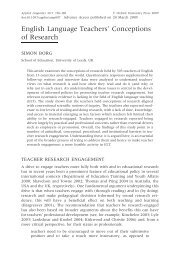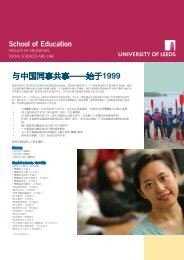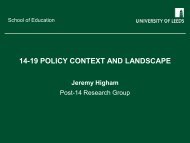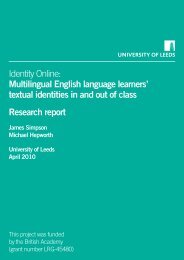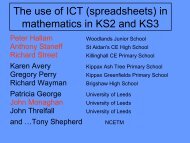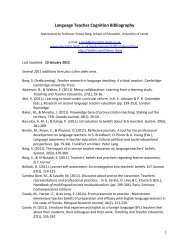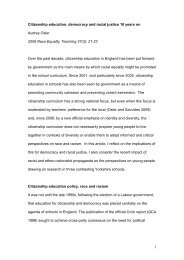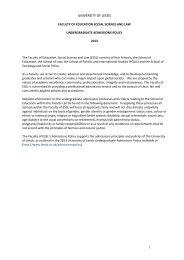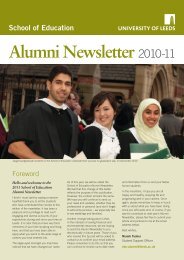Research Students' Annual Conference (RSAC) 2010 - School of ...
Research Students' Annual Conference (RSAC) 2010 - School of ...
Research Students' Annual Conference (RSAC) 2010 - School of ...
Create successful ePaper yourself
Turn your PDF publications into a flip-book with our unique Google optimized e-Paper software.
Room 3 / Beech Grove<br />
Room 2 / St George<br />
<strong>School</strong> <strong>of</strong> Education <strong>Research</strong> Students’ <strong>Annual</strong> <strong>Conference</strong> (<strong>RSAC</strong>) <strong>2010</strong><br />
24 November, University House, University <strong>of</strong> Leeds<br />
Name<br />
Email<br />
Title<br />
10.30 – 10.55 Parallel sessions 2<br />
Mike Hickman<br />
m.hickman@yorksj.ac.uk<br />
Digital audio for self-efficacy<br />
This workshop will focus on teacher trainee use <strong>of</strong> digital audio within an Initial Teacher Education<br />
maths module. Given the need for trainees to develop an understanding <strong>of</strong> the importance <strong>of</strong> ‗talk‘ in<br />
the primary classroom and within mathematical problem solving, podcasting/digital audio was<br />
considered the most appropriate vehicle.<br />
Informed by initial experiences <strong>of</strong> employing podcasting/digital audio to support feedback and<br />
provide additional subject knowledge input, it is now proposed that audio material (recorded and<br />
analysed by the trainees within group tasks) will be used to support problem-solving strategies/selfefficacy<br />
in mathematics teaching. The ambition is for students to not only engage with vital<br />
pedagogy for the classroom but also extend their thinking through more considered investigation <strong>of</strong><br />
peer responses to given problems (more than would be possible within the time constraints <strong>of</strong> a<br />
normal session).<br />
Key questions to be considered include: What kinds <strong>of</strong> discussions should the teacher be initiating<br />
with children? What counts as a high quality response to such a task? The digital audio recordings<br />
will enable trainees to interrogate their own responses (and, indeed, their approach to problem<br />
solving), informed by work such as Mercer‘s (1995) ideas <strong>of</strong> cumulative, disputational and<br />
exploratory talk.<br />
Name<br />
Email<br />
Title<br />
10.30 – 10.55 Parallel sessions 3<br />
Kyriakos Demetriou<br />
kdemetriou@gmail.com<br />
Information communication technology: a tool for inclusion in Cyprus<br />
In the 1990s, the philosophy <strong>of</strong> integration <strong>of</strong> children with SEN in mainstream schools shifted into a<br />
higher target <strong>of</strong> the contemporary educational trend <strong>of</strong> Inclusion. Inclusion portrays a broader vision<br />
<strong>of</strong> integration emphasising the rebuilding <strong>of</strong> the curricular supplies in order for them to be accessible<br />
to all pupils as individuals and increases the likelihood that all teachers will have the opportunity to<br />
have children with SEN in their classroom at some stage in their careers. There is strong literature<br />
evidence that Information Communication Technology can be used as an ultimate tool to support<br />
Inclusion and that it can help teachers to differentiate their instruction, and thus, equalize the learning<br />
opportunities and physical access for every single student in the mainstream classroom. In Cyprus,<br />
the single-computer classroom model provides restricted facilities to teachers who face difficulties for<br />
embedding ICT in their instruction due to limited resources. As such, it would be beneficial to<br />
investigate how the single-computer model can be used for promoting inclusion in mainstream<br />
classrooms in Cyprus. My presentation outlines the framework for the study and the questions it<br />
seeks to address.<br />
6


